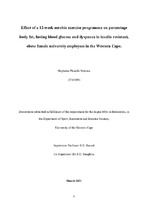| dc.contributor.advisor | Bassett, S.H. | |
| dc.contributor.author | Malema, Maphoko Phindile | |
| dc.date.accessioned | 2021-03-30T07:57:21Z | |
| dc.date.available | 2021-03-30T07:57:21Z | |
| dc.date.issued | 2021 | |
| dc.identifier.uri | http://hdl.handle.net/11394/8089 | |
| dc.description | Magister Artium (Sport, Recreation and Exercise Science) - MA(SRES) | en_US |
| dc.description.abstract | Obesity is recognised as a risk factor for non-communicable diseases which has reached epidemic proportions globally. South Africa is one of the developing countries with significant statistical representation reported for these conditions. Obesity is associated with other conditions such as type 2 diabetes, hypertension and dyslipidaemia which are all part of what is called metabolic syndrome. As a strategy to reduce the levels of obesity, physical activity has been introduced to compliment clients who are on medication for diabetes. | en_US |
| dc.language.iso | en | en_US |
| dc.publisher | University of the Western Cape | en_US |
| dc.subject | Obesity | en_US |
| dc.subject | Type 2 diabetes mellitus (T2DM) | en_US |
| dc.subject | Insulin resistance | en_US |
| dc.subject | Aerobic training | en_US |
| dc.subject | Dyspnoea | en_US |
| dc.title | Effect of a 12-week aerobic exercise programme on percentage body fat, fasting blood glucose and dyspnoea in insulin resistant, obese female university employees in the Western Cape | en_US |
| dc.rights.holder | University of the Western Cape | en_US |

